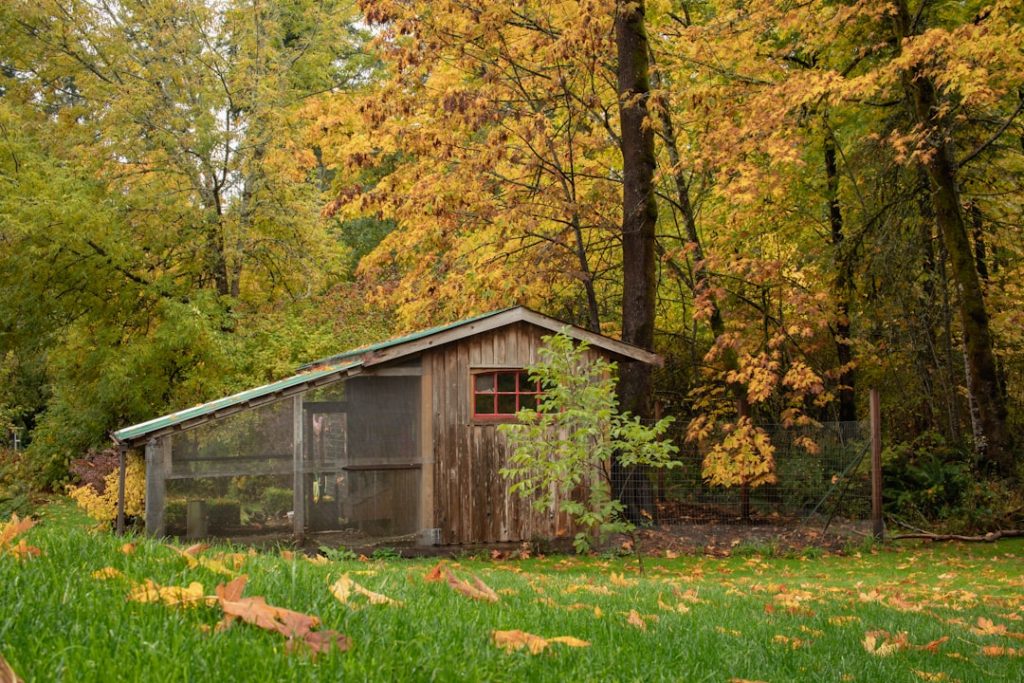Ensuring the safety of chickens during nighttime hours is essential for their overall well-being and protection. Chickens are particularly vulnerable to predators when roosting and sleeping at night. Common threats include foxes, raccoons, owls, and even domestic dogs.
Additionally, unsecured chickens may be at risk of theft. These factors necessitate that chicken owners implement appropriate security measures to safeguard their flock during nighttime hours. The importance of nighttime safety extends beyond physical protection.
Chickens exposed to constant predator threats can experience stress and anxiety, which may negatively impact their health and egg production. By providing a secure nocturnal environment, owners can mitigate potential stress factors, promoting the overall health and productivity of their chickens. This approach allows the flock to thrive in a safe and comfortable setting, contributing to their long-term well-being and contentment.
Table of Contents
Key Takeaways
- Keeping chickens safe at night is crucial for their well-being and protection from predators.
- Predators such as foxes, raccoons, and owls pose a threat to chickens and should be considered when securing them at night.
- Leaving chickens unattended can expose them to potential dangers such as attacks from predators or theft.
- Methods for securing chickens at night include using sturdy coops, locks, and predator-proof fencing.
- Keeping chickens closed up at night can prevent them from wandering into dangerous situations and protect them from predators.
- Free-range chickens require careful consideration and additional security measures to keep them safe from predators.
- Creating a safe and secure coop involves providing adequate ventilation, roosting space, and nesting boxes, as well as regular maintenance and inspections.
Predators that Pose a Threat to Chickens
Common Predators of Chickens
Foxes and raccoons are two of the most common predators that pose a threat to chickens, especially at night when they are most vulnerable. Foxes are known for their cunning and ability to sneak into chicken coops and run off with chickens. Raccoons are also notorious for their ability to break into coops and prey on chickens, often causing significant damage in the process.
Birds of Prey
Owls are another threat to chickens, particularly smaller breeds, as they are skilled hunters and can easily snatch up unsuspecting chickens during the night.
Domestic dogs can also pose a threat to chickens if they are not properly secured at night. Even well-behaved dogs can become curious or agitated by the presence of chickens, potentially causing harm to them if they are able to gain access to the coop.
Protecting Your Flock
It is important for chicken owners to be aware of the potential predators in their area and take the necessary precautions to protect their chickens from harm.
Potential Dangers of Leaving Chickens Unattended

Leaving chickens unattended at night can expose them to a variety of potential dangers. Predators such as foxes, raccoons, and owls are most active during the night, making it the most vulnerable time for chickens. Without proper protection, chickens can easily fall victim to these predators, resulting in injury or even death.
Additionally, leaving chickens unattended at night can also make them susceptible to theft, as unsecured coops can be an easy target for thieves looking to make off with valuable livestock. Furthermore, leaving chickens unattended at night can also lead to increased stress and anxiety for the birds. Without the security of a safe and secure coop, chickens may become restless and agitated, impacting their overall well-being and egg production.
It is important for chicken owners to recognize the potential dangers of leaving chickens unattended at night and take the necessary steps to ensure their safety and security.
Methods for Securing Chickens at Night
There are several methods for securing chickens at night to protect them from potential predators and other dangers. One of the most effective ways to secure chickens is by using a sturdy and predator-proof coop. Coops should be constructed with strong materials and secure locks to prevent predators from gaining access.
Additionally, installing hardware cloth around the coop can help to further deter predators such as raccoons and foxes. Another method for securing chickens at night is by using motion-activated lights or alarms around the coop. These devices can help to scare off potential predators and alert owners to any suspicious activity around the coop.
Additionally, using guard animals such as dogs or even llamas can help to protect chickens from predators by deterring them from approaching the coop.
Benefits of Keeping Chickens Closed Up
Keeping chickens closed up at night offers a variety of benefits for both the chickens and their owners. By keeping chickens securely locked in a coop at night, owners can have peace of mind knowing that their birds are safe from potential predators and other dangers. This can help to alleviate any worries or concerns about the safety of the chickens, allowing owners to rest easy knowing that their birds are secure.
Furthermore, keeping chickens closed up at night can also help to prevent potential stress and anxiety in the birds. By providing a safe and secure environment for chickens to roost and sleep, owners can help to promote a sense of calm and well-being in their birds. This can have a positive impact on the overall health and egg production of the chickens, leading to happier and healthier birds.
Considerations for Free-Range Chickens

Providing a Safe Roosting Area
For those who prefer to allow their chickens to free-range during the day, it is essential to provide a designated area where they can roost and sleep at night. This can be a secure coop or enclosed run that protects them from potential predators and other dangers while still allowing them the freedom to roam during the day.
Training Chickens to Return at Nightfall
Free-range chickens should be trained to return to their designated roosting area at nightfall. This can be achieved by providing treats or food in the coop or run, encouraging the chickens to return on their own accord.
Establishing a Routine for Safety
By establishing a routine for free-range chickens, owners can help to ensure that their birds are safely secured at night without restricting their daytime activities. This routine can include providing food and treats in the coop or run, as well as making sure the chickens are familiar with their roosting area.
Tips for Creating a Safe and Secure Coop
Creating a safe and secure coop is essential for protecting chickens at night. When constructing or purchasing a coop, it is important to use strong materials such as wood or metal that can withstand potential attacks from predators. Additionally, all openings should be covered with hardware cloth or wire mesh to prevent predators from gaining access.
Furthermore, it is important to regularly inspect the coop for any signs of wear or damage that could compromise its security. This includes checking for loose or damaged locks, holes in the walls or roof, and any other potential entry points for predators. By maintaining a secure coop, owners can help to ensure the safety and well-being of their chickens at night.
In conclusion, keeping chickens safe at night is essential for their overall well-being and safety. By taking the necessary precautions to secure chickens at night, owners can protect their birds from potential predators and other dangers while promoting a sense of calm and well-being in their flock. Whether keeping chickens closed up in a secure coop or allowing them to free-range during the day, it is important for owners to prioritize the safety of their birds at all times.
If you’re wondering where to put your chicken coop, you may also be interested in learning about the benefits of renting a chicken coop. According to Poultry Wizard, renting a coop can be a convenient and cost-effective option for those who want to keep their chickens safe and secure at night.
FAQs
Why is it important to keep chickens closed up at night?
It is important to keep chickens closed up at night to protect them from predators such as foxes, raccoons, and owls. Predators are more active at night and can easily harm or kill unprotected chickens.
What are the risks of leaving chickens open at night?
Leaving chickens open at night puts them at risk of being attacked by predators, which can result in injury or death. Additionally, open chickens are more susceptible to stress and may lay fewer eggs.
How can I secure my chickens at night?
You can secure your chickens at night by providing a secure coop with a sturdy door that can be closed and latched. Additionally, make sure the coop is predator-proof by using hardware cloth and ensuring there are no gaps or openings that predators can access.
Can chickens be left open at night in a fenced yard?
Even if your chickens are in a fenced yard, it is still important to secure them in a coop at night. Predators can still find a way to access the yard and harm the chickens if they are left unprotected.
What are the benefits of keeping chickens closed up at night?
Keeping chickens closed up at night provides them with a safe and secure environment, reducing the risk of predator attacks and ensuring their well-being. It also helps to maintain a consistent egg-laying routine and reduces stress on the chickens.
Meet Walter, the feathered-friend fanatic of Florida! Nestled in the sunshine state, Walter struts through life with his feathered companions, clucking his way to happiness. With a coop that’s fancier than a five-star hotel, he’s the Don Juan of the chicken world. When he’s not teaching his hens to do the cha-cha, you’ll find him in a heated debate with his prized rooster, Sir Clucks-a-Lot. Walter’s poultry passion is no yolk; he’s the sunny-side-up guy you never knew you needed in your flock of friends!







